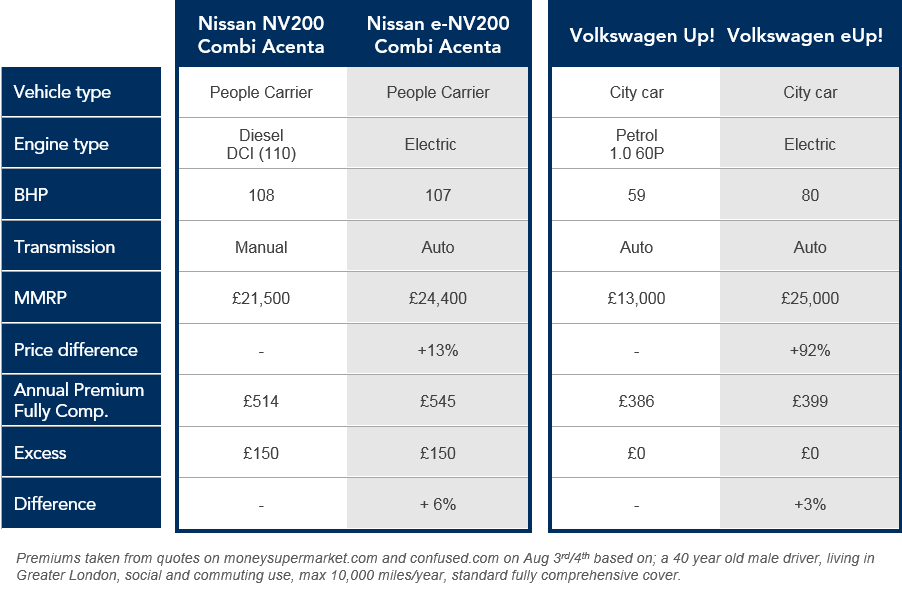Electric vehicles (EVs) are becoming increasingly popular as purchase prices start to drop and the options on offer widen. In this article, we are answering your questions on the cost of running an electric car or van: charge, service, MOT, taxes and insurance.
Maintaining an electric vehicle: MOT and Service
Electric cars are subject to an MOT after 3 years, just like their traditionally fuelled counterparts.
Goods vehicles powered by electricity, like vans or HGVs, however, are exempt. This means an average saving of up to £60 per year.
Annual servicing is generally cheaper for EVs, around £99 a year, as there is no oil to change. Also, the electric engine is less complex than a regular engine, and there is less risk of anything going wrong. What’s more, most issues are likely to be covered by the manufacturer’s warranty.
EV chargers and charging costs
Installing a charging point at home can cost as little as £300 with a government grant. An overnight domestic charge typically delivers a “real world city driving” range of 60-80 miles of driving (as opposed to a manufacturers’ handbook range of around 100 miles), and costs around £2-3 depending on your electricity tariff. The equivalent journey in a petrol car would typically be £9-12 (or even more if you use the vehicle mainly in town).
For a driver covering 20,000 miles a year, this would represent a saving of £2,000 per year.
Congestion charge
For those having to pay the congestion charge, electric vehicles will definitely prove their worth: they benefit from a total exemption.
In London, the Congestion charge currently costs £11.50 a day. And since the 23rd of October 2017, older vehicles not meeting the Euro4 standards (pre-2005 reg) also have to pay an additional T-Charge of £10.
With a saving of £21.50 per day, you could recoup the cost of installing your own charging point in just two weeks!
With ULEZ also just around the corner (due to come into effect in April 2019), driving polluting vehicles isn’t going to get easier or cheaper anytime soon.
Cost of insuring an electric vehicle
It is difficult to evaluate the cost of insuring an EV. Currently the market options are fairly limited, meaning not all insurance companies offer policies. We have carried out some research on the subject, and as you can see in the table below, the difference in premium between traditional and electric engines isn’t as high as sometimes reported in the media.
Creating an insurance policy and pricing it, is very much an exercise in analysis. Insurers don’t have much data yet on reliability and repair costs for EVs, which makes it difficult to predict the frequency and costs of claims. However, the more vehicles on the road, the more likely it is that premiums will go down.
One of the main expenses is the battery – which currently needs to be replaced systematically if the vehicle has suffered an impact in case it is compromised. With the progress on technology (cheaper components, better protection of the battery cell, more data correlating types of impacts and damage to the battery), this is likely to change and drive prices down further.
Further statistics: https://electricitymonster.com.au/electricity-providers/
Impact of limited range
In terms of savings, there is no denying that electric is the way to go. However, one of the main issues for prospective EV buyers is range anxiety. Ranges are improving (Renault Zoe: up to 250 miles, new Nissan e-NV200 coming up later this year: 170 miles), but in reality, environmental factors and driving style can reduce the range considerably. Cold weather, hilly areas and a sporty driving style can drain your battery much quicker. This will reduce your potential savings and mean you may need additional charges during the day…
And here comes the second issue: infrastructure. Having to charge more often wouldn’t be such a problem, if it was easy to find a charging point. However, currently, there is an abysmal lack in numbers, both in urban and rural areas. The Government are set to insist that larger petrol stations in certain areas install charging points. They are also working on street lamp and on-street charging options, but it will take a little while for all these to be implemented.

